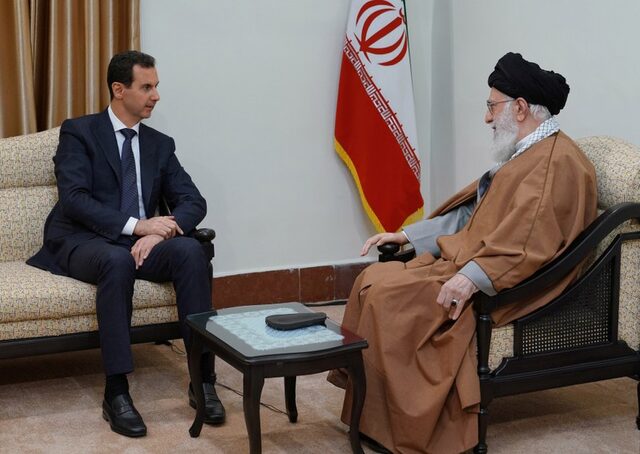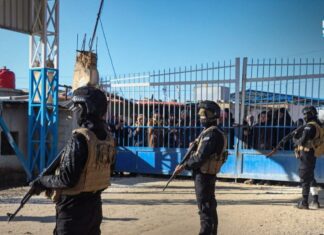
As Bashar al-Assad continues to cling to power in Syria, his regime is quietly adopting a strategy of distancing itself from the escalating tensions between Iran and Israel. For years, Assad was a committed player in the “Axis of Resistance,” an alliance with Iran, Hezbollah, and other groups opposed to Israel. However, recent actions suggest a notable shift in his approach—a calculated attempt to steer Syria away from a direct role in this long-standing conflict. But what drives this shift? And can Assad maintain this delicate balancing act without alienating powerful allies or exposing himself to new threats?
At the heart of Assad’s decision lies the regime’s overriding goal: survival. After more than a decade of civil war, Syria’s economy is shattered, and its military is stretched thin. Engaging in another major conflict, particularly one involving Israel, would only deepen the country’s instability. Assad knows that Syria is in no position to handle the devastating consequences of a new confrontation, especially with its current economic fragility. Lebanese scholar Radwan al-Sayed captures this reality, noting that any new conflict would be catastrophic for Syria’s already exhausted resources.
Assad’s refusal to counter Israel’s frequent incursions into Syrian territory, particularly in the Quneitra region near the Golan Heights, signals this desire to avoid further escalation. To his regional allies, however, this silence could be seen as a betrayal. For Iran, Assad’s shift is potentially damaging. Iran has invested heavily in Syria, both financially and militarily, to maintain its strategic foothold in the region. By distancing himself, Assad risks alienating an ally that has helped him survive during the most perilous years of the Syrian civil war. This could come with consequences—Tehran may not tolerate what it sees as a betrayal of their partnership. Retaliatory measures from Iran, whether political or military, could destabilize Assad’s fragile regime.
On the other hand, Syria remains a key battleground in Israel’s ongoing campaign to curb Iranian influence. Israel continues to launch airstrikes targeting Iranian positions within Syria, undeterred by Assad’s inaction. While the Syrian regime may hope that staying neutral will shield it from Israeli strikes, such hopes are likely in vain. Israel sees Syria as a platform for Iranian operations and will not hold back as long as Tehran maintains a presence there. The question remains: Can Assad distance himself enough to protect his regime, without pushing either Iran or Israel to the point of retaliating against him?
Russia, Assad’s most crucial ally, is playing a central role in shaping his strategy. A recent article from the Al Jazeera Research Center highlighted Moscow’s efforts to prevent the Syrian front from becoming a flashpoint between Israel and Iran. Despite the regional turbulence following events like the “Al-Aqsa Flood,” Russian-Israeli cooperation has remained intact. For Russia, the goal is clear: maintain stability in Syria and avoid any escalation that could distract from its broader strategic goals, including its interests in Ukraine.
Following Assad’s visit to Moscow in July 2024, sources within the Syrian opposition, who are in contact with the Russian Foreign Ministry, revealed that President Vladimir Putin strongly urged Assad to avoid further entanglement in the Iran-Israel conflict. For Moscow, Syria must remain a controlled and stable theater, not a battleground for outside powers. Putin’s message was clear: stay neutral, or risk further destabilization.
While Assad’s immediate focus is survival, this shift has wider regional implications. His distancing from Iran could provide an opening for Arab states like Saudi Arabia or the UAE, who have been quietly re-engaging with Syria in recent years. These states, wary of Iran’s influence, may welcome a more independent Assad regime, potentially leading to deeper diplomatic ties or even economic aid. However, any overt shift towards Arab allies will further strain his relationship with Tehran, making this a delicate balancing act.
Turkey, another regional player with interests in Syria, is also watching closely. Assad’s attempts to remain neutral could either calm Turkish concerns or, conversely, push Turkey to assert its own influence in northern Syria, seeing an opportunity in Assad’s perceived weakness.
Bashar al-Assad’s strategy of distancing Syria from the Iran-Israel conflict is, at its core, a survival tactic. He aims to protect his regime from further chaos by avoiding entanglement in another regional war. However, this approach carries significant risks. Alienating Iran could cost Assad crucial military support, while inaction against Israel’s incursions may embolden his enemies and weaken his position domestically.
As Assad navigates this treacherous path, he is relying heavily on Russian backing and regional diplomacy. Whether this strategy will lead to long-term stability or further isolation remains to be seen. Assad’s future, and indeed Syria’s, hinges on his ability to maintain this precarious balance without tipping the scales against himself.








